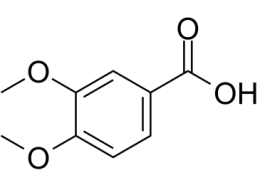In the world of natural health and herbal remedies, some compounds steal the spotlight—think turmeric, resveratrol, or green tea polyphenols. But there’s a lesser-known compound quietly showing remarkable promise in the fields of medicine and nutrition: veratric acid.
Although it may not be as widely recognized as other plant-based compounds, veratric acid is gaining attention for its impressive range of biological properties, from antioxidant and anti-inflammatory effects to potential cancer-fighting abilities. So what exactly is veratric acid, and why is it becoming a topic of interest among scientists and health enthusiasts alike? Let’s dive in.
🌱 What Is Veratric Acid?
Veratric acid (chemically known as 3,4-dimethoxybenzoic acid) is a naturally occurring phenolic acid—a type of plant compound known for its antioxidant activity. Structurally, it is similar to other well-known compounds like vanillic acid and ferulic acid.
You can find veratric acid in various plants and plant-based foods, including:
- Mushrooms (especially edible and medicinal varieties)
- Grains, like wheat and barley
- Fruits and vegetables
- Certain herbal medicines, such as Aristolochia bracteolata
It may not be consumed in large quantities through a regular diet, but its biological effects even at low doses have sparked interest in its therapeutic applications.
🧪 Key Health Benefits of Veratric Acid
Over the last decade, numerous laboratory and animal studies have explored the potential health benefits of veratric acid. Here are some of the key findings:
🔸 1. Antioxidant Activity
One of the most studied properties of veratric acid is its ability to neutralize free radicals—unstable molecules that can cause cellular damage and contribute to chronic diseases, aging, and even cancer.
Veratric acid acts as a free radical scavenger, protecting cells from oxidative stress. This may help reduce the risk of conditions associated with oxidative damage, such as cardiovascular disease and neurodegenerative disorders.
🔸 2. Anti-inflammatory Effects
Chronic inflammation is at the root of many health problems, including arthritis, diabetes, and heart disease. Studies suggest that veratric acid can suppress inflammatory responses by interfering with pro-inflammatory enzymes and signaling pathways.
This makes it a potential candidate for natural anti-inflammatory therapies, especially for people looking to reduce inflammation without relying on synthetic drugs.
🔸 3. Anti-cancer Potential
Some of the most exciting research on veratric acid involves its anticancer activity. In test-tube and animal models, veratric acid has demonstrated the ability to:
- Inhibit the growth of cancer cells
- Induce apoptosis (programmed cell death) in malignant cells
- Reduce the spread of tumors in certain cancer types
While these findings are still in the early stages, they point to the possibility of veratric acid being used as a complementary treatment in oncology—especially when combined with other natural or conventional therapies.
🔸 4. Antimicrobial and Antifungal Activity
Veratric acid also shows promise as a natural antimicrobial agent, capable of inhibiting the growth of certain bacteria and fungi. This could be particularly useful in an era where antibiotic resistance is on the rise.
Researchers are exploring its use in topical treatments for skin infections, as well as in preservatives for natural health products.
🧴 Emerging Uses in Skincare and Nutrition
Thanks to its antioxidant and anti-inflammatory properties, veratric acid is beginning to make its way into cosmetic and nutraceutical products. Some skincare brands are looking into veratric acid as a natural ingredient to:
- Protect the skin from oxidative damage
- Soothe inflammation
- Reduce signs of aging caused by UV exposure
In the nutraceutical industry, it may soon be included in supplements aimed at promoting general wellness, immunity, and cellular protection.
⚠️ Safety and Considerations
So far, veratric acid has shown a good safety profile in research studies, with low toxicity and minimal side effects. However, most of the data comes from lab and animal studies. Human clinical trials are still limited, so it’s important not to jump to conclusions.
As with any supplement or herbal remedy, it’s best to consult a healthcare provider before using veratric acid in concentrated form—especially if you’re pregnant, breastfeeding, or taking medication.
🌟 Final Thoughts
Veratric acid may not be as famous as other plant-based compounds, but it’s certainly one to watch. With its broad spectrum of biological activities—antioxidant, anti-inflammatory, anticancer, and antimicrobial—it holds potential in both preventive health and therapeutic applications.
As researchers continue to uncover the secrets of plant-based medicine, natural compounds like veratric acid could play a key role in the future of healthcare. Whether through diet, skincare, or supplements, this humble phenolic acid might just become a powerful ally for your health.
Curious to learn more about natural health compounds? Stay tuned for more articles on emerging botanicals, nutraceuticals, and science-backed wellness trends!

